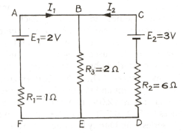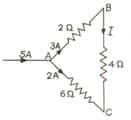Kirchhoff's Laws
Important Questions on Kirchhoff's Laws
Calculate the currents and in the given The cells have negligible internal resistances.

Two cells of emf's and and internal resistances and respectively are connected in parallel to send current in the same direction through an external resistance of . Draw the circuit diagram. Using Kirchoff's laws, calculate the current through each branch of the circuit and p.d. across the resistance.
Two cells and of emf's and respectively, each having an internal resistance of send current in an external resistance of . Find the magnitudes and the directions of currents and flowing through the cells and .

In the given circuit and are two cells of emfs and respectively, having negligible internal resistances. Applying Kirchhoff’s laws of electrical networks, find the values of and .

In the circuit shown in figure, and . Using Kirchhoff's laws, find currents flowing through resistors and (internal resistance of each of the batteries is negligible)

A part of an electric circuit is shown in the figure below :

Using Kirchhoff's law, find the current flowing through the resistor.
The figure show parts of electrical circuits. Compute in each case.

The figure show parts of electrical circuits. Compute in each case.

On which conservation principle is Kirchhoff's second law of electrical networks based?
Which conservation principle is involved in Kirchhoff s first law of electric circuits?
Name the two conservation laws implied in Kirchhoff s law for electric circuits.
State Kirchhoffs laws for electric circuits and write the corresponding association of conservation of the quantities. Draw diagram in support of laws.
State and explain Kirchhoff's laws for electric circuits. What are the conservation laws implied in each law? State the sign convention for current and emf. Use the given circuit for your explanation.

State Kirchhoff's second law (loop rule) as a mathematical equation, mentioning what the symbols used stand for.4)
State Kirchhoffs first law (Junction rule) and prove that it is simply a statement of the conservation of charge.

